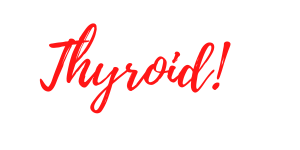
The thyroid gland is located in the lower part of the thyroid cartilage, in the front part of the neck.
This small area of our anatomy, which appears in embryonic development between weeks 3 and 5, has a very prominent importance, since it is in charge of regulating our cellular metabolism. To do this, the thyroid produces 2 main types of hormones, T4 or thyroxine and T3 or triiodothyronine . These hormones influence practically all the organs of our body and are necessary to synthesize a large number of proteins, also influencing the metabolization of carbohydrates. Therefore, it plays an especially important role in times of growth and development.
Cause of underactive thyroid
The most common cause of hypothyroidism is due to an alteration in the immune system, called Hashimoto’s hypothyroidism. Other causes are:
- Diet iodine deficiency
- Radiotherapy treatments
- Removal of the thyroid gland.
- Thyroid nodules
- Intake of some drugs.
- Development of a viral infection
- An alteration occurs in the glands of the brain responsible for stimulating the thyroid (pituitary or hypothalamus). This type is called secondary hypothyroidism.
Main symptoms
As I mentioned earlier, thyroid hormones are related to a large number of areas of our body. That is why the symptoms can be very varied and manifest in different areas, depending on which organs their functional activity is affected.
Among the most common symptoms are :
- Increase in body weight.
- Anemia
- Constipation
- Hair loss
- Tiredness
- In women, irregular menstrual cycles
- Tremors in the hands
- Lack of concentration
- Impaired development in children
- Goiter is one of the consequences of an underactive thyroid normally caused by a deficiency of iodine in the diet. It produces an enlargement of the thyroid to try to counteract the low production of thyroid hormones.
Diet for hypothyroidism
Once the disease is diagnosed through a blood test that measures our hormone levels, in addition to the prescribed pharmacological treatment, following a diet prescribed by a dietitian-nutritionist can be of great help.
In order for the thyroid gland to make the hormones T3 and T4, it needs iodine. This mineral must be obtained through food in our diet.
Vitamins and Supplement that Support Thyroid Function
Below we explain energy supplement and other nutrients that helps to fight against thyroid issues. In addition to iodine, there are other important Vitamins and nutrients to ensure proper production of T4 and its conversion into T3. These are:
- Zinc: present in red meat, seafood, wheat germ and nuts.
- Iron: present in all meats and fish in its most bioavailable form.
- Manganese: abundant in nuts, seeds, and whole grains.
- Vitamin A: in the form of beta-carotene through green vegetables (chard, spinach), red (tomato, pepper) and orange (carrot, mango, pumpkin, moniato).
- Selenium – Found in Brazil nuts, whole grains, seafood, and dairy.
Hyperthyroid or iodine-rich foods
A healthy adult needs about 200 mcg of iodine per day. According to the WHO (World Health Organization) 40% of the world’s population is at risk of having a deficiency of this mineral. The Galician Society of Endocrinology, Nutrition and Metabolism has studied the areas of Spain with the greatest iodine deficiency, these are: Andalusia, Asturias, Catalonia, Extremadura, Galicia and Castilla.
Iodine is a mineral found in the soil and therefore, depending on the iodine richness of the farmland, the vegetables that are consumed will have more or less of this mineral. Another important source of iodine is the sea, so we recommend consuming seafood such as fish and shellfish . It is advisable to monitor the consumption of seaweed, since its iodine content is so high that it could alter the thyroid gland. Today 2 important strategies have been applied to avoid iodine deficiency in the diet. The most important is the iodization of salttable (not to be confused with sea salt that loses iodine in its preparation). The other is to administer fortified feed to milk-producing cows, so dairy consumption is also a good source of this mineral.






